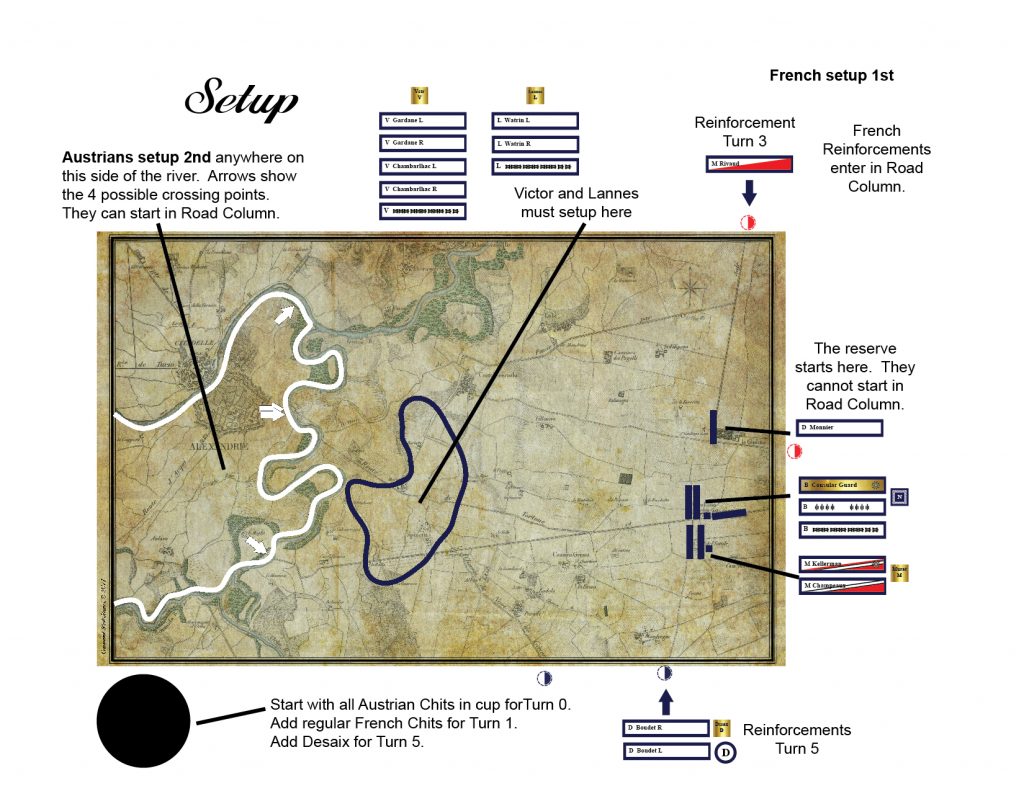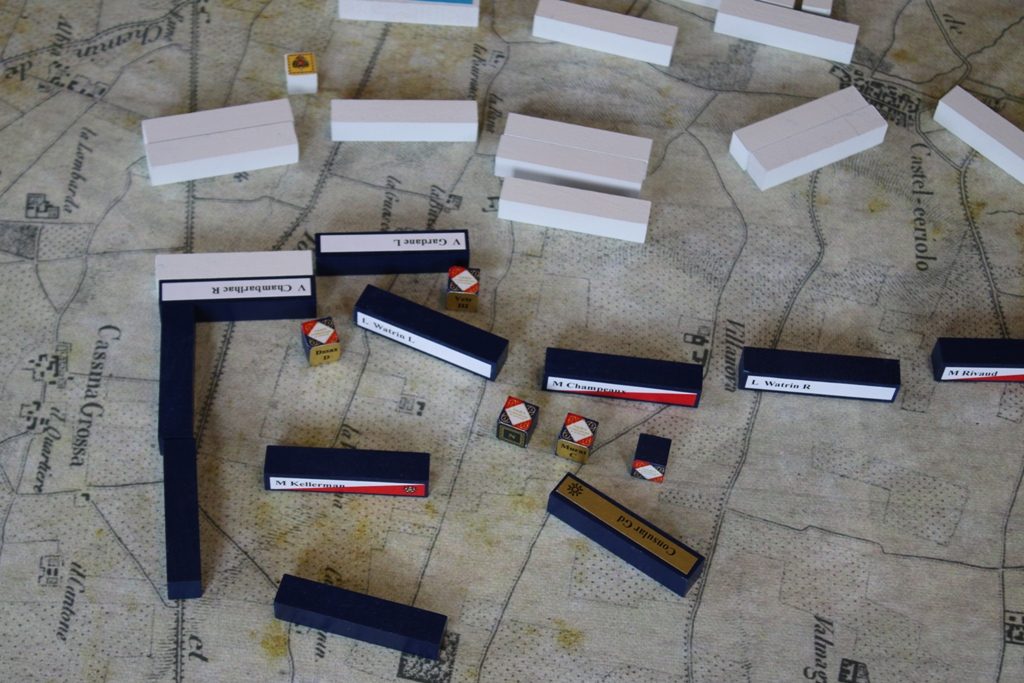How do you win the game in Pub Battles? I love the new Victory Conditions. They are much more in line with real military objectives. They sound real and feel real. Games can’t always do this but I love it when they can describe things in real world terms.
For example, how do you win?
Be the first player to reach 20 points.
OR
Defeat the enemy army.
Ok, the second victory condition here sounds much better but what does that mean in game terms? As a gamer, this feels a little fuzzy. How do we do that exactly?
I got this question via email today:
What are the concrete victory conditions for Marengo? Is it to destroy the opponents army, or exit off the boards…?
Let’s take a look at the rules. What is the Objective for the Scenario?
Both sides are running out of time. The French are sitting on the Austrian supply line! The Austrians MUST breakout and reestablish a supply line to the north or east. The French are also in a very tenuous and overextended position. They must defeat the Austrian army to end this campaign.
Ok, so let’s break this down. The Austrians MUST breakout. They can’t just carefully attack and then fall back if things start going bad. An Austrian controlled retreat back to base at Alexandrie is a fail: They lose.
The Austrians can win by marching out of Alexandrie and off the board along their marked north / east supply lines. I’m pretty sure the French are going to have a lot to say about that. So the Austrians are going to have to fight their way through the French army to get to those supply lines.

These are the Victory Conditions for the Scenario. The standard Victory Conditions from the basic rules are also in play. So if the Austrians are ‘routed’ (suffer 50% losses) while trying to breakout, they lose. They also lose if the French can ‘break’ them (sack an Austrian baggage train) while trying to breakout to the north east.
What about a ‘forced back’ result? The Austrians deploy for battle, fight the French, clear a supply line, then pack up their trains and march safely off a supply line while keeping their casualties below 50%. That sounds pretty good to me. I’d call that a breakout: Austrian Victory.
Of course this would all be much more simple, if the Austrians just march out there and destroy the French. If they can ‘rout’ or ‘break’ the French army, then it is pretty easy to establish your supply line again right? Heck, you don’t even need to at that point. You just defeated Napoleon. The campaign is over!

So what is the answer to our email question? Is the objective to exit off the board or destroy the enemy? In short, it is both. All of the above.
See how this is much more in line with real world, military terms? How do you win? It’s complicated. –but it makes sense. Much better than something like: be the first player to get 20 points.
We like to get gamers thinking like real officers, not gamers. The real world is messy and complicated. Yes, you’re gonna have to use your brain and think about things. It’s not going to be that simple but that’s good! That’s the best kind of learning and training you can do.
It’s also a lot of fun. =)

I agree : new rules and new objective give a better experience of the battle. Breaking the french line or contain the austrian army without too much losses is not so easy. If you add the baggage train problems : unpack or not ? That’s the way i like to play Marengo.
Yes!!
We need to do a video / blog on baggage trains next.
Regarding the parallel between the historical victory conditions of the French and Austrians, and the victory conditions of Pub Battles Marengo, let’s go back to June 1800.
Context.
An Austrian army commanded by Mélas was in northern Italy to threaten southern France while another Austrian army was on the defensive in Germany.
Melas is an offensive Austrian general who pushes back French General Massena in Genoa and General Suchet at his bases. He clearly has the initiative and the French southern front threatens to collapse.
Napoleon reacts. The 1st Consul sends an army commanded by Moreau to fix the Austrian army of Germany and he moves with a “reserve” army towards the Saint Bernard pass. His plan and challenge is to cross the Alps and to position himself on the rear of the army of Mélas, thus cutting off his lines of communication: this is the manoeuvre on the rear!
Mélas managed to retake Genoa, occupied by Masina, with the support of the English fleet when he learned of the arrival of a French army on his rear.
Mélas must get out of this mousetrap or his whole army will be trapped. Orders of regrouping are sent to all his units. Planned location: Alexandria.
The Austrian must decide quickly on 3 possibilities :
1: To move towards Milan.But headed right towards the presumed positions of the French and their lines of communication.
2: Go to Genoa and re-establish lines of communication through the English. But, or his confidence is limited towards the English and their capacity to supply 30000 men on a long term or his offensive spirit leads him to brandish the iron rather than to let himself be locked up in a mousetrap, reduced to impotence. In addition, General Suchet, in his offensive return, hinders his maneuver in the southwest.
3: To move offensively towards Piacenza, towards the East.The French are not all south of the Po River, his army is strong, balanced, the French will naturally retreat northward, his lines of communication will be quickly re-established, he serenely envisages a battle and Melas will continue his strategic mission.
Considering his 3 possibilities, a general like this war professional, chose the way of Piacenza. It is natural.
His assets: surprise, strength, short distance to go, initiative, optimism.
However, if Mélas does not succeed in forcing the French: his army is lost. No more lines of communication, encirclement, supplies….
So, for the Austrians, there were only 2 conditions for victory in this battle: destroy the French army or force the passage to Plaisance.
Which is in line with the victory conditions of Pub Battles!
For the French: The First Consul has no choice: he must destroy the Austrian army or prevent it from reconnecting with its lines of communication (which seals his fate). In accordance with Pub Battles!
All this confirms Pub Battles Marengo’s good choices on the conditions of victory. Of course we add the baggage trains, but without supplies, battle point and army point !
(French grognards use to call austrians “other dogs” = “Autrichiens // Autres chiens” : It sounds likewise in french.
French version for french Pub Battles lovers!
En ce qui concerne le parallèle entre les conditions de victoire historiques des français et des autrichiens, et les conditions de victoire de Pub Battles Marengo, retournons en juin 1800.
Contexte.
Une armée autrichienne commandée par Mélas se situe en Italie du Nord afin de menacer le sud de la France pendant qu’une autre armée autrichienne se tient sur la défensive en Allemagne.
Mélas est un général autrichien offensif qui repousse le général français Massena dans Gène et le général Suchet sur ses bases. Il a clairement l’initiative et le front sud français menace de s’effondrer.
Napoléon réagit. Le 1er Consul envoie une armée commandée par Moreau fixer l’armée autrichienne d’Allemagne et il se dirige avec une armée de « réserve »vers le col du Saint Bernard. Son projet et son défi et de franchir les Alpes et se poster sur les arrières de l’armée de Mélas, lui coupant ainsi ses lignes de communication : c’est la manoeuvre sur les arrières!
Mélas est parvenu à reprendre Gène, occupé par Masina, avec l’appui de la flotte anglaise lorsqu’il apprend l’arrivée d’une armée française sur ses arrières.
Mélas doit se sortir de cette souricière ou s’est toute son armée qui sera prise au piège. Des ordres de regroupement sont envoyés à toutes ses unités. Lieu prévu : Alexandria.
L’autrichien doit se décider rapidement sur 3 possibilités :
1 : Se diriger vers Milan. Mais s’est se diriger en plein vers les positions présumées des français et leurs lignes de communication
2 : Se diriger vers Gène et rétablir ses lignes de communication grâce aux anglais. Mais, ou sa confiance est limitée envers les anglais et leur capacité à ravitailler 30000 hommes sur un long terme ou son esprit offensif le porte à brandir le fer plutôt qu’à se laisser enfermer dans une souricière, réduit à l’impuissance. En outre, le général Suchet, dans son retour offensif, gène sa manoeuvre au sud ouest.
3 : Se porter offensivement vers Plaisance, vers l’Est. Les français ne sont pas tous au sud du fleuve Pô, son armée est forte, équilibrée, les français reculeront naturellement vers le nord, ses lignes de communication seront rapidement rétablies, il envisage sereinement une bataille et Mélas poursuivra sa mission stratégique.
Compte tenu de ses 3 possibilités, un général comme ce professionnel de la guerre, choisi la voie de Plaisance. C’est naturel.
Ses atouts : la surprise, la force, la faible distance à parcourir, l’initiative, l’optimisme.
Toutefois, si Mélas ne parvient pas à forcer les français : son armée est perdue. Plus de lignes de communication, encerclement, ravitaillement….
Donc, pour les autrichiens, 2 seules conditions de victoire dans cette bataille : détruire l’armée française ou forcer le passage vers Plaisance.
Ce qui est conforme aux conditions de victoire de Pub Battles !
Pour les français : Le premier Consul n’a pas le choix : il doit détruire l’armée autrichienne ou l’empêcher de renouer avec ses lignes de communication (ce qui scelle son destin). Conforme à Pub Battles !
Tout ça confirme les bons choix de Pub Battles Marengo sur les conditions de victoire. Bien sûr on rajoute les trains de bagages, mais sans ravitaillement , point de bataille et point d’armée ! Bien joué les gars !
(les grognards français appelaient les autrichiens, les “Autres chiens” : jeu de mots. )
Awesome analysis! Can I use this and post it as a Blog? I think more people will see it then.
This makes me want to see a campaign scale game on the whole area!
Yes, you can. But you should have to correct my language before : mistake are made i guess.